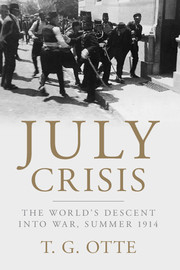Book contents
- Frontmatter
- Dedication
- Contents
- List of illustrations
- List of maps
- Preface and Acknowledgements
- List of abbreviations
- List of the principal dramatis personae
- Europe, 1914
- The Balkans, 1914
- Introduction
- 1 Prelude: the road to Sarajevo
- 2 Sarajevo and its echoes: 28 June to 5 July
- 3 The triumph of tactics over strategy: 6 to 21 July
- 4 Localizing the crisis: 19 to 23 July
- 5 The ultimatum: 23 to 26 July
- 6 Localizing the war: 26 to 28 July
- 7 Escalation: 29 July to 4 August
- Conclusion
- Index
- Plate section
- References
Preface and Acknowledgements
Published online by Cambridge University Press: 05 July 2014
- Frontmatter
- Dedication
- Contents
- List of illustrations
- List of maps
- Preface and Acknowledgements
- List of abbreviations
- List of the principal dramatis personae
- Europe, 1914
- The Balkans, 1914
- Introduction
- 1 Prelude: the road to Sarajevo
- 2 Sarajevo and its echoes: 28 June to 5 July
- 3 The triumph of tactics over strategy: 6 to 21 July
- 4 Localizing the crisis: 19 to 23 July
- 5 The ultimatum: 23 to 26 July
- 6 Localizing the war: 26 to 28 July
- 7 Escalation: 29 July to 4 August
- Conclusion
- Index
- Plate section
- References
Summary
‘And so they’ve killed our Ferdinand’, said the charwoman to Švejk . . . ‘Which Ferdinand, Mrs Müller?’, he asked . . . ‘Oh no, sir, it’s His Imperial Highness, the Archduke Ferdinand, from Konopište, the fat churchy one . . . They bumped him off at Sarajevo, with a revolver, you know. He drove there in a car with his Archduchess.’
JAROSLAV HAŠEKThe First World War has cast a long shadow over the twentieth century, and beyond. One hundred years on, the horror of the conflict still commands attention, and will probably never cease to do so. How and why the civilized world, seemingly so secure in its material and intellectual achievements, could have descended into a global conflict has continued to intrigue not just historians, but also the general public. It has certainly puzzled me ever since I first developed an interest in the past. And the more I studied the period of the long nineteenth century, the more it became clear to me that the answer, in so far as there can be one, is not to be found in les forces profondes, the vast impersonal forces, that some think shape historical processes, but, rather, that the reasons, in so far as they can ever be fathomed, may be glimpsed in the doings of men (and they were all men in 1914), their flaws and failings, their calculations and miscalculations. It would be difficult to improve on Marx’s insight that people make their own history, if not under circumstances of their choosing. Politics more especially are subject to the ambiguities of free will and the play of the contingent. In that lies hope for the future; but it is also a reminder of man’s shortcomings. What follows here is an attempt to make sense of the events of Europe’s last summer.
- Type
- Chapter
- Information
- July CrisisThe World's Descent into War, Summer 1914, pp. xi - xiiiPublisher: Cambridge University PressPrint publication year: 2014

